The Global Peace Efforts of Shaykh-ul-Islam Dr Muhammad Tahir-ul-Qadri: A Bridge between East and West
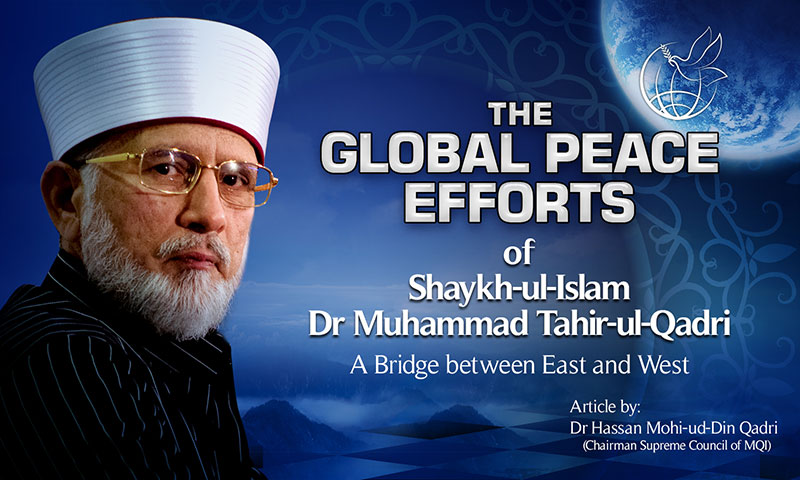
The Global Peace Efforts of Shaykh-ul-Islam Dr Muhammad Tahir-ul-Qadri:
A Bridge between East and West
by Dr Hassan Mohi-ud-Din Qadri
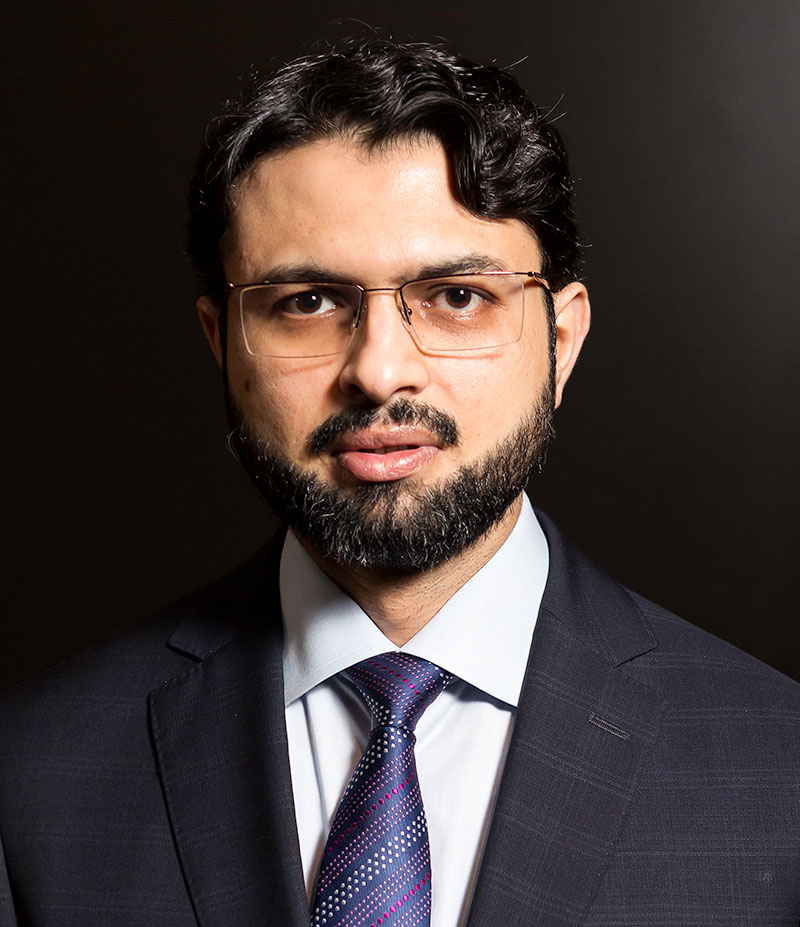 Addressing and resolving the complex and acrimonious relationship between the East and West
is one of the most concerning and pressing issues of modern times. Throughout history,
a destructive and adversarial pattern of behaviour, imbued with mutual distrust
and doubt, has dominated the entire fabric of the global relationship between these
two poles. The need for intercultural understanding and mutual political accommodation
has therefore never been higher. The Oriental mind-set remains aggrieved by what
is perceived as the Occident’s hostile, contradictory and confused approach towards
Islam. It sees its global strategies and policy preferences for maintaining stability
and security as not translated into actual practice.
Addressing and resolving the complex and acrimonious relationship between the East and West
is one of the most concerning and pressing issues of modern times. Throughout history,
a destructive and adversarial pattern of behaviour, imbued with mutual distrust
and doubt, has dominated the entire fabric of the global relationship between these
two poles. The need for intercultural understanding and mutual political accommodation
has therefore never been higher. The Oriental mind-set remains aggrieved by what
is perceived as the Occident’s hostile, contradictory and confused approach towards
Islam. It sees its global strategies and policy preferences for maintaining stability
and security as not translated into actual practice.
The origin of the conflict between the West and Islamic World is multifactorial and can be viewed from multiple perspectives. The international political ramifications of this ideological divide culminated in Western military incursions in the Middle East and beyond. The 9/11 attacks became a watershed event, exacerbating the misunderstanding of Islam by the West and its negative consequences, and from which global terrorism by militants in the name of the religion brought the question of the relationship of Islam with extremism to the global political stage.
The succession of wars in Afghanistan and the Middle East following 9/11 have led to the collapse of peace and harmonious coexistence. Western intervention in the region has continued to exacerbate the East-West ideological divide, inflaming tensions and causing expressions of antagonism and violence, resulting in severe strategic problems. Fear of dominance by the opposing side became the mainspring of defence policy for many countries and thus a reason for repressive and authoritarian policies designed to control the masses.
The strategic policies formed in the ‘War on Terror’, and their consequent impact on East-West relations, has sucked into its sphere every region of the world, resulting in a ‘War of Narratives’. The world is witness to the immense cost of this conflict, which has thrown humanity into one crisis after another. While a few strategic gains may have been made, the predominant impact has been the emergence of hatred, strife, disunity, social unrest, mass displacement of people, extremism and terrorism fuelled by sectarianism, along with many other societal ills.
These uncompromising militant policies and actions have paved the way for the young to consider the legitimacy of suicide bombings and terrorist attacks against Western powers and interests, ultimately propped up by Kharijite philosophy, and the futile ideology of terrorists who confuse their claims with the teachings of Islam. This philosophy has galvanized hostile groups worldwide and has stimulated the sympathy and support of an even wider pool. Terrorists indoctrinate and induct youngsters into their violent and heinous beliefs but their misrepresentations and misinterpretations of Islam have no foundations. In actual terms, the 9/11 terrorists hijacked Islam and symbolically attempted to project their dominance and expansionist designs through the worst act of violence imaginable.
The call of the hour was the restriction of their expansion by striking at the roots of their ideology, but unfortunately, the War of Narratives with its qualifications and justifications of acts of extremist violence with “ifs” and “buts” caused many to breathe their last and 1.6 billion Muslims to become synonymous with terrorism.
In such prevailing circumstances, no Muslim scholar has been at the forefront of countering the ideology and narrative of extremism than the great leader of Minhaj-ul-Quran International. Shaykh-ul-Islam Dr Muhammad Tahir-ul-Qadri is an Islamic scholar, revivalist and a man of excellent national and international repute, who throughout his life has proclaimed the actual concept of Islam, which is peace, love, mercy, tolerance and harmony.
Using narrative analysis, Dr Qadri examined the prevailing perceptions responsible for intensification of the conflict, which were resulting in nothing other than decay, collapse and deterioration. He brought to light the constituents of Eastern hostility towards the West, and identified the elements of extremist ideology and promotors of radicalization. These elements gave an extreme portrayal of Islamic ideology and promoted a false image of Islam. Misinterpretation of the sources of Islam—the Qur’an, Prophetic traditions and Sunnah—gave rise to misguided acts from people of the East, whose impact on the West has threatened to shatter the entire fabric of societies. That impact has drawn a grossly distorted picture of Islam in the West, which has become associated with extreme viewpoints and ultimately seen as a violent religion. The suppression of the true message of Islam, which is moderate, peace-loving and compassionate has fuelled Islamophobia, which has perpetuated the incorrect image of Islam as the ‘jihadi’ religion and depicted Islam to be the preeminent terroristic faith.
This was not the only challenge Islam was facing. Intra-religious conflict was intensifying, and escalating the threat to global peace and security. Addressing this issue, Dr Qadri brought divergent groups of Islam to the unanimous point of harmony and understanding, resolving conflict through the formation of a treaty. The I‘lamia-e-Wahdat (Proclamation of Unity) signed on 10th January 1990, created harmony and promoted tolerance between different schools of thought. Through promoting mutual acceptance, he contributed towards the elimination of the hatred existing in the Sunniism of the East. The ideology of Minhaj-ul-Quran International resolved the hostility and extreme conservativism of a belief system imported from the constraining and narrow-minded aspects of the Aryan cultural legacy. When debate would arise, it would create an environment of confrontation and hostility, which had become a barrier to the intellectual and ideological development of the East. Shaykh-ul-Islam Dr Muhammad Tahir-ul-Qadri repaired the prevailing culture of dispute through the citation of knowledge and wisdom from pure sources. Time has witnessed that his intellect dawned with full glory and brought the truth to the fore.
With his personal capacities and endeavours, he inculcated tolerance among the masses, everything the culture of fruitless debate and making evident what had been obscure for a long time. He didn’t entertain the allegations and claims from the opposing sides but provided the accusers with inexhaustible reservoir of Qur’anic references and original sources, resulting in the decline of their ill-fated ideologies with the passage of time. It was a time when the Sunnis used to hesitate in proclaiming their love for Ahl al-Bayt, and were not courageous enough to adopt the public demonstration of their love for the blessed family of the Prophet (pbuh). Dr Qadri taught Sunnis what they forgot—that the love of Ahl al-Bayt is incumbent upon them to complete their faith. Adding to this, he made it clear that the love of Ahl al-Bayt is part and parcel of the Prophet’s love. Removing the deficiencies of knowledge, he gave courage to Islamic scholars and removed them from the fear they bore. He resolved the theological controversies of the East such as the organising of Majalis of Dhikr-e-Hussain, the culture of the celebration of the Mawlid, and proclamation of the salutations of peace upon the Beloved Prophet (pbuh), etc., which had been opposed by some minor religious philosophies.
In 1990, when Dr Tahir-ul-Qadri stepped onto Western shores, the disastrous situation was revealed to him. Islam was being used by terrorists and extremist for their ideological motives and young people were being diverted from the right path. Kharijites under the banner of various movements, were using Islamic theology for their own expansion and were rapidly undermining and destabilising an entire generation of the Muslims.
Keeping this in view, Dr Tahir-ul-Qadri established an organizational network of Minhaj-ul-Quran International in more than 90 countries within a short span of time. Directors, members and students of Minhaj-ul-Quran reached the four corners of the world with the message of peace, harmony and love, maintaining peace through proper education.
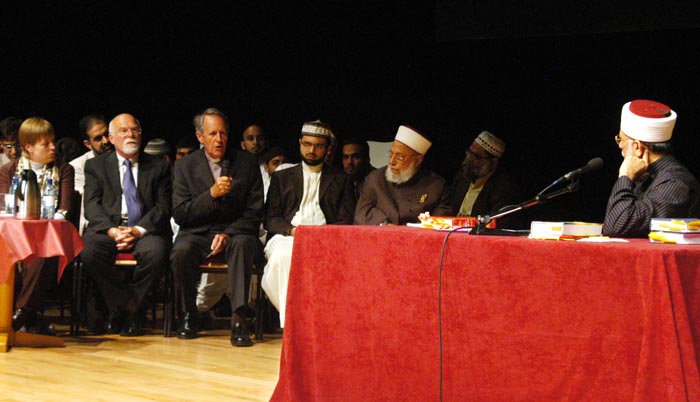
Photo: Representative of the Arch Bishop of Canterbury asking a question in al-Hidayah 2009
Since 2004, Minhaj-ul-Quran has organised annual Al-Hidayah camps, for Western Muslim youth, addressed by Dr Tahir-ul-Qadri, continuing the struggle against extremism, radicalisation and terrorism through promoting the true message of Islam. This retreat has proved effective in radicalisation of the Muslim youth by extremists. Over a thousand young people from the United Kingdom, Europe and North America attend the three-day camp every year.
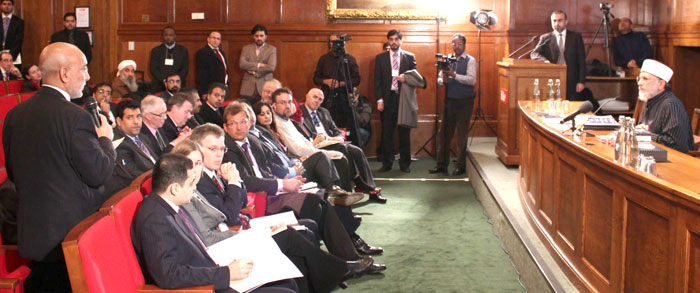
Photo: Q&A during launch of Fatwa on Terrorism and Suicide Bombings
In 2010, when the spectre of terrorism was gaining strength and distorted versions of Islam were misleading the young, he stepped forward and launched a Fatwa against terrorism and suicide bombings. With full momentum he dismantled the ideological potential of extremism and radicalisation and resolved misunderstandings through interaction and understanding. Young people turned away from extremist ideologies, finding much satisfaction in remaining in a state of peace and love and mutual understanding.
Dr Joel S. Hayward—a former dean of the Royal Air Force College, Cranwell and Head of Air Power Studies at King’s College London—states: “In March 2010 I breathed a huge sigh of relief when I read that an internationally renowned Islamic scholar, recognised throughout the world as an authority on the Quran and the Sunna, had issued a prodigiously researched Fatwa which demonstrated from scrupulously reliable sources that terrorism and suicide bombings are so wickedly un-just and un-Islamic that their evil cannot be justified by recourse to discussions of intention. Regardless of intention, the evil act remains an evil act. I was struck by the fact that the scholar behind this fatwa, unlike any previously issued, is unquestionably a scholar of unimpeachable reputation whose almost four decades of meticulous research have produced scores of influential books.”
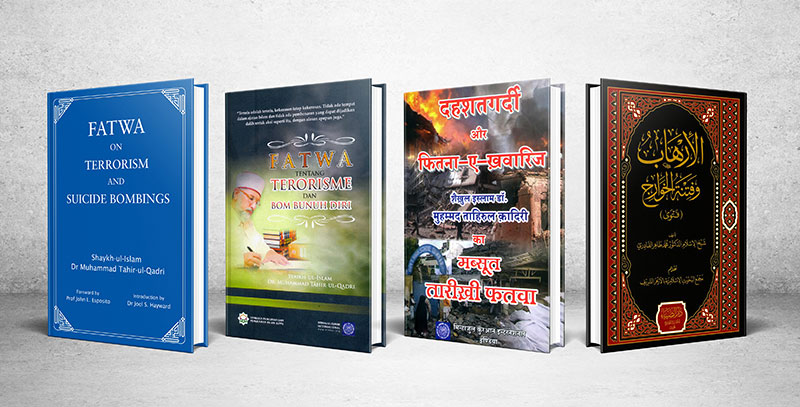
Fatwa on Terrorism and Suicide Bombings
The Fatwa has been translated into many European and Asian languages including Arabic so that it can benefit humanity the world over. This clear and categorical edict provided some relief to the tensions between East and West. The Fatwa gained global acceptance and was appreciated and endorsed by the major Western think tanks and research institutes.
After the publication of the Fatwa, which remains a milestone contemporary work in counter-extremism, Dr Qadri participated in many interviews and media talks at both national and international levels. Dr Qadri was invited to seminars and conferences organized by governments, institutions and think tanks around the globe. Prof John L. Esposito from Georgetown University invited Dr Qadri to deliver a lecture series on the Fatwa. Speaking to US government officials, including the US army, navy and air force cadets, academicians, policy makers, representatives of various organisations and agencies, Dr Tahir-ul-Qadri clarified the authentic concept of jihad in Islam and clearly refuted the arguments of extremists and their justifications of terrorist activities, which they misuse for their own political ends. Another address was delivered at the prestigious think-tank, the United States Institute of Peace. Clarifying again the concept of jihad, Dr Tahir-ul-Qadri removed all misinterpretations and confusions pertaining to the subject with reference to the Qur’an and Sunnah.
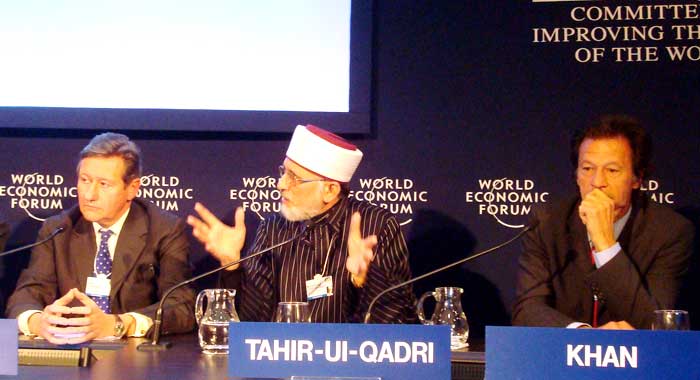
Photo: Dr Tahir-ul-Qadri presenting solutions to tackle terrorism at the WEF 2011
The Fatwa’s influence continued growing and, in 2011, Dr Qadri participated in the World Economic Forum, where, in tackling the issues of terrorism and presenting the solutions to it, he gave a detailed talk elucidating how terrorism comes into existence through five phases of conservatism, sectarianism, extremism, radicalism, and finally terrorism.
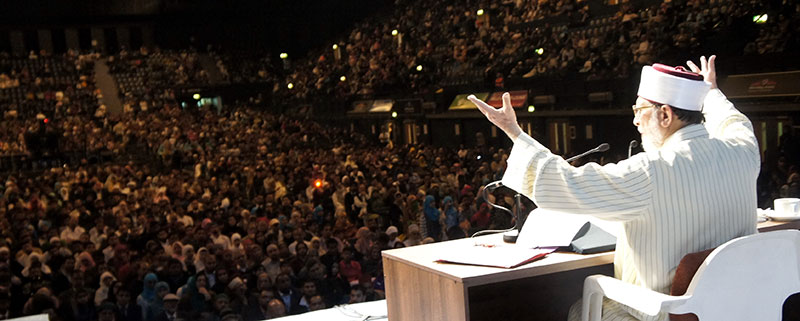
Photo: Dr Tahir-ul-Qadri addressing The Peace for Humanity Conference, London, 2011
In 2011, Minhaj-ul-Quran International organised the Peace for Humanity Conference, which was held in London at the Wembley Arena, attracting an audience of over 12,000 people. Dr Qadri delivered the message of inter-faith harmony and explained that Islam is based on integration, brotherhood and peaceful co-existence. All faiths came together on one platform and the message of unity, love, solidarity and mutual co-existence was delivered in emphatic terms. Religious scholars, community leaders and key leaders of Islam, Christianity, Judaism, Hinduism, Sikhism and Buddhism attended the conference, which was streamed live on Muslim TV channels and various multimedia globally.
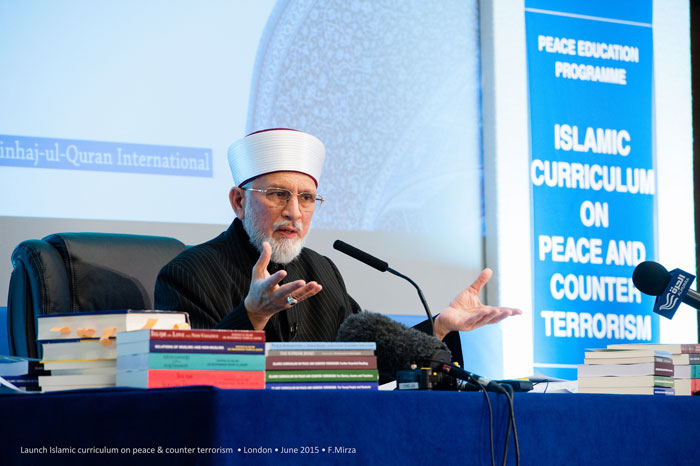
Dr Tahir-ul-Qadri launching the curriculum in London, 2015
In 2015, Dr Tahir-ul-Qadri launched a counter-terrorism curriculum to combat the message of Islamist extremist groups such as ISIS and Al-Qaeda. He univocally and categorically stated:
“This is not a process that started yesterday. Radicalization began to happen 30 years ago.”
“You can see this gradual process of grooming by extremist groups such as IS and we must address that, and the arguments used by IS to justify their criminal, terrorist activities.”
“You have to tell young people that IS and others are giving them the wrong interpretations of Islamic concepts such as jihad.”
“Many young people do not have the scriptural or textual knowledge to interpret their religion properly and Islamic State exploits the emotions and the idealism of the young, although this ideology has nothing to do with the Qur’an.”
“So this curriculum goes to the source material of Islam, and answers the questions young people are asking.”
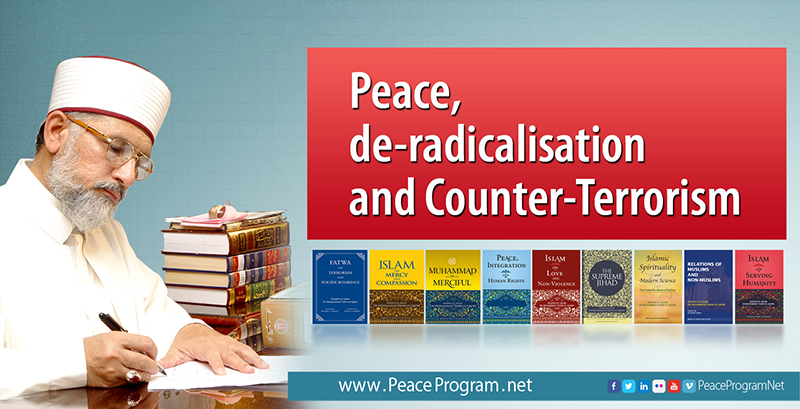
Islamic Curriculum on Peace and Counter-Terrorism
The recent International Conference on “Religious Pluralism and World Peace” at Minhaj University Lahore is a continuing thread of his struggle for peace and combatting extremist ideologies.
Shaykh-ul-Islam Dr Muhammad Tahir-ul-Qadri has urged a change in perceptions and new ways of thinking; he has rectified the prevailing tendencies to understand Islam in negative and restrictive terms. He has emphasised categorically that Islam encourages pacifism, denounces war, ensures the globalisation of peace, and holds humanity supreme. He has travelled throughout the globe promoting peaceful dialogue to develop mutual understanding between communities, religions and nations. His tangible works and immense achievements are testament to his peace-giving aims and intentions. No other person has done more to bridge the gap of understanding and perceptions between East and West.
Copyrights © 2026 Minhaj-ul-Quran International. All rights reserved
